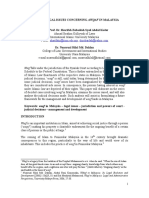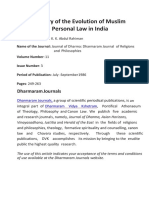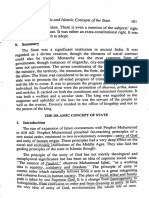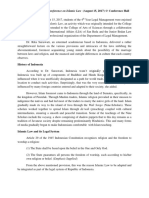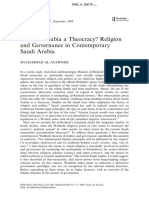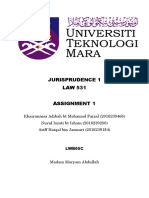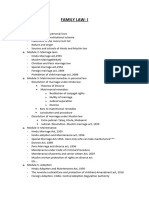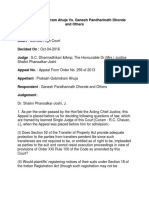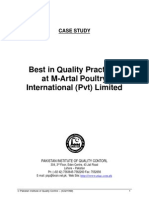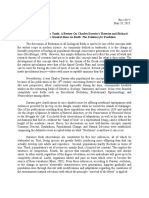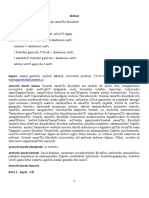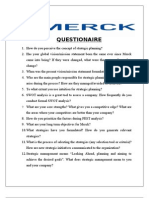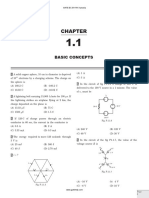Owned Land Land Code: Foreword
Owned Land Land Code: Foreword
Uploaded by
umer109Copyright:
Available Formats
Owned Land Land Code: Foreword
Owned Land Land Code: Foreword
Uploaded by
umer109Original Description:
Original Title
Copyright
Available Formats
Share this document
Did you find this document useful?
Is this content inappropriate?
Copyright:
Available Formats
Owned Land Land Code: Foreword
Owned Land Land Code: Foreword
Uploaded by
umer109Copyright:
Available Formats
As it relates to land, the Islamic belief that man serves Allah when he makes use of property translates into
the judicial law that property can be acquired under Islamic law through developing and using land that has been unclaimed by anyone (Bashir 75). Generally, under Islamic tenure systems, land is classified into four main categories: mulk (individual ownership with full rights); miri (state owned land to which individuals may gain use rights); waqf (religious foundation owned land "stopped for God"); and musha (collective or tribal owned land) (Payne n.p.). Malaysia's National Land Code ( Under Islamic law, ownership rights originate from the concept of stewardship of property according to God's will (Bashir 75). This concept is based on the Islamic belief that God owns all property and men are merely trustees or custodians. Thus, traditionally, in Islam, when a State gave land to its subjects, it gave only the right to use the land and not full ownership. However, men are enabled to act for the care of the property and nothing in Islamic law prohibits the use of this property to generate wealth and other capitalistic aims (See Bashir 75). Today, these Islamic beliefs continue to guide legislative land codes in Arabic Muslim countries although, as the case of Saudi Arabia will demonstrate, some governments have adapted their land ownership schemes to have greater control over the country's political economy and to encourage increased agricultural production.
FOREWORD Recently a few books have been written about the rights of non-Muslims who are subjugated to the rule of the Islamic law. Most of these books presented the Islamic view in a favorable fashion, without unveiling the negative facet inherited in these laws. This brief study attempts to examine these laws as they are stated by the Four Schools of the Fiqh (jurisprudence). It aims at revealing to the reader the negative implications of these laws without ignoring the more tolerant views of modern reformers. Our ardent hope that this study will reveal to our readers the bare truth in its both positive and negative facets. S.S.
Concept of "Islamic State"
"An Islamic state is essentially an ideological state, and is thus radically different from a national state." This statement made by Mawdudi lays the basic foundation for the political, economical, social, and religious system of all Islamic countries which impose the Islamic law. This ideological system intentionally discriminates between people according to their religious affiliations. Mawdudi, a prominent Pakistani Muslim scholar, summarizes the basic differences between Islamic and secular states as follows:
1)
You might also like
- Current Legal Issues Concerning Waqaf in MalaysiaDocument24 pagesCurrent Legal Issues Concerning Waqaf in MalaysiaDedy Ahmad WiryadiNo ratings yet
- Feasibility Study of A UniversityDocument54 pagesFeasibility Study of A Universityumer109100% (1)
- Anne Fliotsos, Gail S. Medford - New Directions in Teaching Theatre Arts-Springer International Publishing - Palgrave Macmillan (2018)Document312 pagesAnne Fliotsos, Gail S. Medford - New Directions in Teaching Theatre Arts-Springer International Publishing - Palgrave Macmillan (2018)Jubilee B. Salvatiera50% (2)
- The Rights of Non-Muslims in An Islamic StateDocument7 pagesThe Rights of Non-Muslims in An Islamic StateIOSRjournalNo ratings yet
- Muslim Law of InheritanceDocument22 pagesMuslim Law of InheritanceMaithili Limaye75% (4)
- Introdution To Islamic Law PDFDocument28 pagesIntrodution To Islamic Law PDFfikayo66No ratings yet
- Current Legal Issues Concerning Awqaf in Malaysia Dr. Nuarrual Hilal Md. Dahlan Dr. Sharifah Abdul KaderDocument24 pagesCurrent Legal Issues Concerning Awqaf in Malaysia Dr. Nuarrual Hilal Md. Dahlan Dr. Sharifah Abdul KaderEyqa NazliNo ratings yet
- Islamic Constitutionalism Not Secular. N PDFDocument27 pagesIslamic Constitutionalism Not Secular. N PDFradiarasheedNo ratings yet
- The Concept of Islamic StateDocument10 pagesThe Concept of Islamic StateMuhammad HassaanNo ratings yet
- Rehann Muslim LawDocument18 pagesRehann Muslim LawMoid RehanNo ratings yet
- History of The Evolution of Muslim Personal Law - K. K. Abdul RahimanDocument16 pagesHistory of The Evolution of Muslim Personal Law - K. K. Abdul RahimanAnkit Yadav100% (1)
- Difference Between Western and Islamic Concept of StateDocument5 pagesDifference Between Western and Islamic Concept of StateQUDRAT ULLAH KHAN NIAZINo ratings yet
- Constitutional Law: An Overview of The Islamic Approach and Its Contemporary RelevanceDocument9 pagesConstitutional Law: An Overview of The Islamic Approach and Its Contemporary RelevanceMuhd ZainabNo ratings yet
- Islamic Jurisprudence AssignmentDocument11 pagesIslamic Jurisprudence AssignmentAnonymousNo ratings yet
- Muslim LawDocument58 pagesMuslim Lawsaket shandilyaNo ratings yet
- Islamic Jurisprudence AssignmentDocument6 pagesIslamic Jurisprudence AssignmentHamza ChNo ratings yet
- The Rights of Women To Inheritance Under Islamic Law: A Detailed AnalysisDocument44 pagesThe Rights of Women To Inheritance Under Islamic Law: A Detailed AnalysisTariq KhanNo ratings yet
- 269-Article Text-1969-1-10-20221231Document5 pages269-Article Text-1969-1-10-20221231abdul hadiNo ratings yet
- Kamali Characteristicsislamicstate 1993Document25 pagesKamali Characteristicsislamicstate 1993WAJEEHA GOHARNo ratings yet
- Islamic EconomicsDocument51 pagesIslamic EconomicsLaiba WaqarNo ratings yet
- Concept of An Islamic State in Pakistan by Justice Nasim Hasan Shah, Chief Justice of Pakistan (1980s)Document10 pagesConcept of An Islamic State in Pakistan by Justice Nasim Hasan Shah, Chief Justice of Pakistan (1980s)timbaktu198050% (2)
- Analyzing-Maududian-Discourse-on-Minorities-in-an-Islamic-State (3)Document10 pagesAnalyzing-Maududian-Discourse-on-Minorities-in-an-Islamic-State (3)Shawkat AhmadNo ratings yet
- Various Kinds of OwnershipDocument7 pagesVarious Kinds of OwnershipNajeebkhankakarNo ratings yet
- Blaw 101 Group 10Document8 pagesBlaw 101 Group 10ADJEI MENSAH TOM DOCKERYNo ratings yet
- Islamic EconomicsDocument51 pagesIslamic Economicsrimsha34602No ratings yet
- Hadis HTN UTSDocument3 pagesHadis HTN UTSSyaif AnggaNo ratings yet
- Islam and Human RightsDocument7 pagesIslam and Human RightsAsy LimNo ratings yet
- Family Law ProjectDocument24 pagesFamily Law ProjectIzaan RizviNo ratings yet
- 8 - Chap Ter3Document69 pages8 - Chap Ter3gaardiNo ratings yet
- islamic concept of stateDocument13 pagesislamic concept of stateshreyajaguri77No ratings yet
- KMPMDocument21 pagesKMPMShubham SarkarNo ratings yet
- Uniform Civil Code ProjectDocument22 pagesUniform Civil Code ProjectAbhishek Chatterjee100% (2)
- Pakistan 1973 Constitution Is Not Islamic by Kasim JavedDocument3 pagesPakistan 1973 Constitution Is Not Islamic by Kasim Javedzarrar1010No ratings yet
- Harvard Law Professor Noah Feldman: Diversity in PracticeDocument11 pagesHarvard Law Professor Noah Feldman: Diversity in PracticeDeeti ShahNo ratings yet
- Uniform Civil Code For India: Project OnDocument22 pagesUniform Civil Code For India: Project OnNishant AwasthiNo ratings yet
- What Is Law??Document5 pagesWhat Is Law??Abdul JabbarNo ratings yet
- Islamic Law Prof. Mark CammackDocument4 pagesIslamic Law Prof. Mark Cammackawhee_leeNo ratings yet
- IJ AssignmentDocument3 pagesIJ AssignmentTalha KhanNo ratings yet
- MythsDocument7 pagesMythsapi-26547187No ratings yet
- Muslim Personal Law, Uniform Civil Code and Judicial Activism-A Critical StudyDocument16 pagesMuslim Personal Law, Uniform Civil Code and Judicial Activism-A Critical StudyG MadhaviNo ratings yet
- The Application of Sharia in SomaliaDocument6 pagesThe Application of Sharia in SomaliaDr. Abdurahman M. Abdullahi ( baadiyow)No ratings yet
- Pakistan Legal SystemDocument5 pagesPakistan Legal Systemprincesjutt100% (1)
- JBLC's Summary of The Conference On Islamic Law (August 15, 2017) at Conference HallDocument4 pagesJBLC's Summary of The Conference On Islamic Law (August 15, 2017) at Conference HallJoe CaliNo ratings yet
- Pajares - Shari'ah Prelim ExaminationDocument7 pagesPajares - Shari'ah Prelim ExaminationRikki Marie PajaresNo ratings yet
- Is Saudi Arabia A Theocracy Religion andDocument17 pagesIs Saudi Arabia A Theocracy Religion andJohn GomezNo ratings yet
- Understanding Islamic Law and JurisprudenceDocument8 pagesUnderstanding Islamic Law and JurisprudencemudsaraleeiNo ratings yet
- Jurisprudence 1 LAW 531 Assignment 1Document18 pagesJurisprudence 1 LAW 531 Assignment 1KyriosHaiqalNo ratings yet
- Muslim Law - PolygamyDocument8 pagesMuslim Law - PolygamyLakshana RaghavanNo ratings yet
- NATURE AND SCOPE OF ISLAMIC LAWDocument11 pagesNATURE AND SCOPE OF ISLAMIC LAWadeolarenaeNo ratings yet
- 1 Jus Corpus LJ318Document12 pages1 Jus Corpus LJ318FARIS NATTUKALNo ratings yet
- Paper On Application of Muslim Law Published On JCLJDocument11 pagesPaper On Application of Muslim Law Published On JCLJshreyashukla.gsolllbNo ratings yet
- Rights IslmcJur LL B3 23 IJTDocument5 pagesRights IslmcJur LL B3 23 IJTzaibijutt741No ratings yet
- Jamia Millia Islamia, New Delhi: Ashay Kaushik 15 Iii RD Semester B.A.LL.B (Hons.)Document18 pagesJamia Millia Islamia, New Delhi: Ashay Kaushik 15 Iii RD Semester B.A.LL.B (Hons.)Rahul GuptaNo ratings yet
- Family Law-IiDocument49 pagesFamily Law-IiDinabandhu MahataNo ratings yet
- Family LawDocument23 pagesFamily LawRoop ChaudharyNo ratings yet
- Sharia Adalat: Islamic JurisprudenceDocument18 pagesSharia Adalat: Islamic JurisprudenceSharjeel AhmadNo ratings yet
- Islamic Jurisprudence AssignmentDocument15 pagesIslamic Jurisprudence AssignmentAnonymousNo ratings yet
- Islamic Law of Inheritance and Women - The Myth of MisogynyDocument33 pagesIslamic Law of Inheritance and Women - The Myth of MisogynyJéssica MunizNo ratings yet
- FAMILY LAW I Class NotesDocument9 pagesFAMILY LAW I Class NotesTapas DevaiahNo ratings yet
- Islam and The Modern Law of Nations by Majid KhadduriDocument16 pagesIslam and The Modern Law of Nations by Majid KhadduriBabar KhanNo ratings yet
- Development of Muslim Law in India A Ret PDFDocument12 pagesDevelopment of Muslim Law in India A Ret PDFAjab GazabNo ratings yet
- Language ContentsDocument1 pageLanguage Contentsumer109No ratings yet
- Languages and AlphabetsDocument1 pageLanguages and Alphabetsumer109No ratings yet
- Study of Languages in SchoolsDocument1 pageStudy of Languages in Schoolsumer109No ratings yet
- Language Curriculum FilesDocument1 pageLanguage Curriculum Filesumer109No ratings yet
- Alphabets and LanguagesDocument1 pageAlphabets and Languagesumer109No ratings yet
- Hindu Indian Calender 2016Document5 pagesHindu Indian Calender 2016gurunathpkNo ratings yet
- Supreme Court of PakistanDocument6 pagesSupreme Court of Pakistanumer109No ratings yet
- Order Sheet in The Lahore High Court Lahore. Judicial DepartmentDocument13 pagesOrder Sheet in The Lahore High Court Lahore. Judicial Departmentumer109No ratings yet
- Indian CaselawDocument1 pageIndian Caselawumer109No ratings yet
- Judgment Sheet in The Lahore High Court, Lahore Judicial DepartmentDocument9 pagesJudgment Sheet in The Lahore High Court, Lahore Judicial Departmentumer109No ratings yet
- PR 4-2 Investment Proposal ENGDocument11 pagesPR 4-2 Investment Proposal ENGumer109No ratings yet
- Cpla - 6Document27 pagesCpla - 6umer109No ratings yet
- Indrajaal VidhaanDocument1 pageIndrajaal Vidhaanumer109No ratings yet
- Undertaking From Student&Parents GuardianDocument1 pageUndertaking From Student&Parents Guardianumer109No ratings yet
- A Guide To FundraisingDocument13 pagesA Guide To Fundraisingumer109No ratings yet
- Best in Quality Practices at M-Artal Poultry International (PVT) LimitedDocument11 pagesBest in Quality Practices at M-Artal Poultry International (PVT) Limitedkoib789No ratings yet
- Greek LiteratureDocument3 pagesGreek Literaturemagicnikki100% (1)
- Module 5 - UtilitarianismDocument3 pagesModule 5 - UtilitarianismJadeMNo ratings yet
- The Blueprint To HustleDocument17 pagesThe Blueprint To HustleDr-Chambers175% (8)
- BENT3333: Rubric For Assessing Teamwork (PO8) - Sem 2 2010/2011Document2 pagesBENT3333: Rubric For Assessing Teamwork (PO8) - Sem 2 2010/2011Elaine yuanNo ratings yet
- Jainism, Or, The Early Faith of AsokaDocument172 pagesJainism, Or, The Early Faith of AsokaRohitNo ratings yet
- Dawkins and DarwinDocument4 pagesDawkins and DarwinIyaElagoNo ratings yet
- CHAPTER 7-Group DynamicsDocument27 pagesCHAPTER 7-Group DynamicsDenise CruzNo ratings yet
- York Notes OthelloDocument2 pagesYork Notes OthelloHenry JOhnsonNo ratings yet
- Silabusi Filosofiashi +Document64 pagesSilabusi Filosofiashi +nat1a-nat1aNo ratings yet
- Guinea Pig Zero, Tin HouseDocument4 pagesGuinea Pig Zero, Tin HouseCarl ElliottNo ratings yet
- IRVM 2006 CH 9Document13 pagesIRVM 2006 CH 9ASIM KUMARNo ratings yet
- 4th ModuleDocument5 pages4th ModuleJanz Jacob FloresNo ratings yet
- Strategic Report QuestionnaireDocument4 pagesStrategic Report QuestionnairemadihashkhNo ratings yet
- Chapter 3 - CriteriaDocument27 pagesChapter 3 - CriteriaRohm JavNo ratings yet
- Timeline of Hindu Texts - WikipediaDocument3 pagesTimeline of Hindu Texts - WikipediaPallab ChakrabortyNo ratings yet
- lesson plan华文 p5 作文A 单元5 PDFDocument1 pagelesson plan华文 p5 作文A 单元5 PDFJoanne ZYNo ratings yet
- TP2 Discreta - 2012Document5 pagesTP2 Discreta - 2012Lucas VellonNo ratings yet
- ,kbuihi NM/LDocument513 pages,kbuihi NM/Lamirsuryahidayah100% (5)
- Rizal Law RA 1425Document26 pagesRizal Law RA 1425Pamela Lite57% (7)
- Worksheet 6th Grade ReadingDocument2 pagesWorksheet 6th Grade ReadingGianina MihăicăNo ratings yet
- Holy Matrimony ReportDocument39 pagesHoly Matrimony ReportAndrea LimuacoNo ratings yet
- Colors in MeditationDocument5 pagesColors in MeditationRoshan GillNo ratings yet
- Argument Maps - WorksheetDocument4 pagesArgument Maps - WorksheetSri Pat100% (1)
- ChinaX Part 1 - Unit 4-6Document26 pagesChinaX Part 1 - Unit 4-6Matheus BrandãoNo ratings yet
- Compliance Audit and Corporate Financial Performance-Banks in Rivers StateDocument9 pagesCompliance Audit and Corporate Financial Performance-Banks in Rivers StateAlexander DeckerNo ratings yet
- IR 2 - Implementation of Single Pass Algorithm For ClusteringDocument4 pagesIR 2 - Implementation of Single Pass Algorithm For ClusteringSushil SontakkeNo ratings yet
- Part One-Motivational Programs For Workers of Jute Industry in BangladeshDocument20 pagesPart One-Motivational Programs For Workers of Jute Industry in BangladeshMizanur RahmanNo ratings yet
- Electrical CircutsDocument58 pagesElectrical CircutssreekanthaNo ratings yet
- Indemnity and Hold Harmless ClausesDocument28 pagesIndemnity and Hold Harmless ClausesMahnoor Maalik100% (1)






